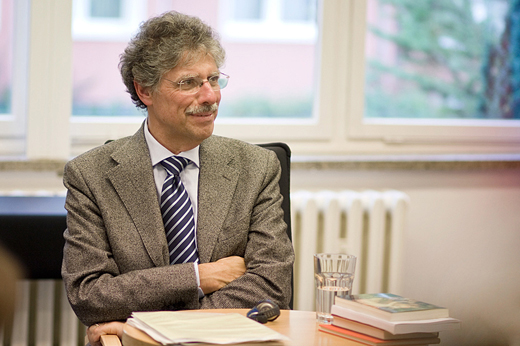
In a guest lecture for the BA1 and AY Core Course, ECLA was glad to welcome one of today’s most distinguished classicists. Glenn Most received his BA from Harvard in 1972, continued his studies in Oxford for his MA and received his M.Phil. and a Ph.D. from Yale in 1978. Simultaneously, he received another Ph.D. from the Universität Tübingen. Since then, he has taught at many different institutions, such as Princeton, Heidelberg and the University of Chicago. Currently he is a professor of Ancient Greek at the Scuola Normale in Pisa.
About to publish a revision of a sixty-year-old translation of Euripides’ play The Bacchae for the University of Chicago Press, Most introduced us to Greek tragedy in general, the peculiarities of this particular play, and the reasons that made a revision of Arrowsmith’s translation necessary. The audience deeply appreciated Most’s engaging manner, profound enthusiasm for his subject, and keen willingness to communicate complex and subtle details about his project and the history, reception and transformation of Eurpides’ best-known work.
As professor, who had lectured in front of ECLA students before, Most showed great enthusiasm about having this opportunity once again. He began by giving us a biographical overview of Euripides’ life. A man of few friends and many enemies, Euripides did not engage in his hometown’s patriotic activities and eventually left Athens for a self-imposed exile in Macedonia in 407 BC. In The Bacchae, one of his most famous tragedies today, he shows how the Dionysian cult came from Asia to Thebes and dramatizes the antagonisms—while also blurring the boundaries—between Greeks and Asians, gods and men, and men and women.
In addition to the god Dionysus and the insanity he brings—a fundamental trope of tragic theatre—this play also carried a certain message to Euripides’ former fellow citizens in Athens. Would they accept the tragedies of Euripides, a man famous for being an Atheist, in their city? Their situation parallels that of Pentheus, the ruler of Thebes, in the play, who will not acknowledge Dionysus in his city, and consequently has to face the god’s revenge. According to Most, the narrative structure that supports the main plot, tragedy follows the logic of an emotional experience which is shown to be essential for the well-being of a city. In fact, when The Bacchae was staged in Athens after he had died in 406 BC, it won the first prize, which had never happened to any of Euripides’ plays during his lifetime. During the Middle Ages, the play almost completely vanished, leaving to us only two very incomplete manuscripts. It was not long ago that the play was rediscovered and became one of the most popular today, being shown in many productions that mostly focus on a very orgiastic and sexual depiction of the Bacchae, which does not really correspond to their original description.
Following this detailed account of the play, Most continued by telling us about the work he is currently doing in completely revising Arrowsmith’s rather old translation. By adding introductions and going over every word in every line, Most and a colleague from Berkeley collaborating with him on the project try to get as close as possible to the Greek original, while at the same time preserving the voice of the translator. Also, several passages needed a totally new translation since they contained many typographical mistakes. In this work Most and his colleague stumbled upon other issues in the old translation, such as its very Christianised character, which had been created by drawing upon the language of the New Testament. In addition there are textual problems in Arrowsmith’s idea of staging. In order to present a less biased view, the two are working on a way to make clear to the reader where the differences between ordinary discourse, sung parts and chanted parts lie in The Bacchae, as well as seeking to use more a contemporary vocabulary.
by Johanna Fürst (AY’12, Austria)
